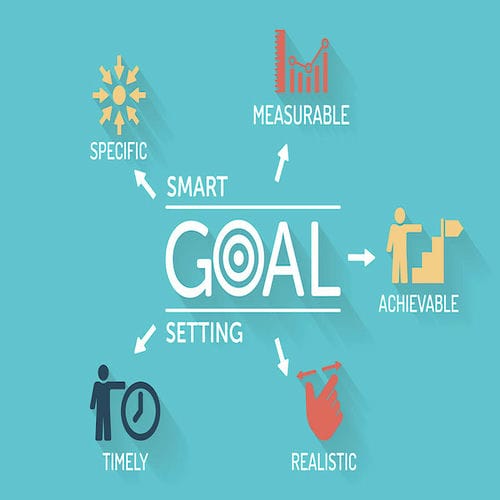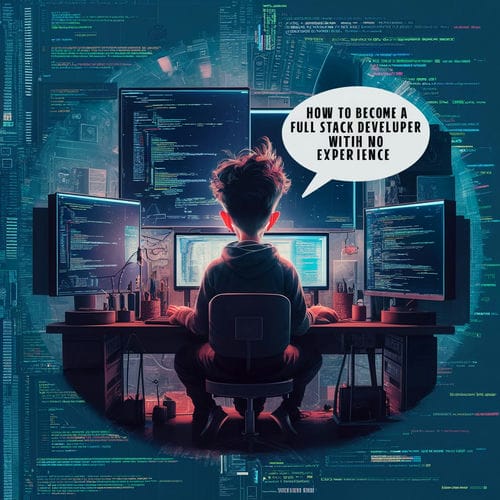Are you ready to unlock the secrets how to become a full stack developer with no experience? Whether you’re a tech enthusiast eager to dive into the world of coding or a career changer looking for new opportunities, mastering full stack development opens doors to endless possibilities. In this guide, we’ll walk you through the exciting journey of how to become a full stack developer with no experience.
You might be wondering, “How exactly can I become a full stack developer without any background in coding?” Well, fear not! With the right guidance and determination, anyone can learn the principles of full stack development, regardless of their starting point. From understanding the fundamentals to building practical skills and navigating the job market, we’ve got you covered every step of the way.
So, if you’re ready to unleash your creativity, and begin an exciting journey into the world of coding, then you’ve come to the right place. Whether you’re a newbie coder or a seasoned pro looking to expand your skill set, this guide is your road-map to mastering full stack development and building a successful career in tech.
let’s dive into the wonderful world of full stack development together!
How to Become a Full Stack Developer with No Experience?
So, you’re interested in the world of coding and dreaming of becoming a full stack developer, but there’s a little glitch that you have zero experience. Don’t worry; you’re not alone. In fact, many successful developers started from scratch, just like you.
What exactly is a full stack developer? Well, consider them the masterminds of the technology industry. They possess the skills to build both the front-end and back-end of web applications, as well as manage databases and handle everything in between. In essence, they are the masterminds behind the stunning user interfaces you come across on the internet every day.
Now, you might be wondering, “Can I really break into this field without any prior experience?” The short answer: absolutely! While it may appear frightening at first, with the right mindset and approach, you can have your way into the world of full stack development, regardless of your background.
Throughout this guide, we’ll unravel the mystery behind full stack development, outline the essential skills you need to acquire, and provide actionable steps to kick-start your journey. Whether you’re a recent graduate, career changer, or simply someone with a passion for technology, this guide is your road-map to mastering the art of full stack development from scratch.

Understanding Full Stack Development
1. Definition of Full Stack Developer
Alright, let’s kick things off by shedding some light on what exactly a full stack developer is. They’re the ultimate multitaskers of the tech world. They’re not just limited to one area; they’re proficient in both the front-end and back-end of web development, along with handling databases and version control systems. In simpler terms, they’re the genius of the coding universe!
2. Skills Required for Full Stack Development
Now, let’s talk about the skills you’ll need to conquer the realm of full stack development. First up, we’ve got front-end development – think of this as the visual side of things, where you make websites appear elegant and user-friendly. Then, there’s back-end development – behind-the-scenes magic that makes everything work smoothly. Next on the list is database management – because what’s a website without a solid foundation of data? Don’t forget about version control systems – these are your secret weapons for managing and tracking changes to your code. Last but not least, numerous problem-solving abilities will be required and critical thinking abilities to tackle any coding challenge that comes your way.
3. Advantages of Pursuing a Career in Full Stack Development
So, why should you consider going deeply into the world of full-stack development? Well, aside from the fact that building almost anything you can think of is incredibly fantastic, there are numerous benefits to working in this industry. For starters, full stack developers are in high demand – like, really high demand. Companies are constantly on the lookout for talented individuals who can handle both front-end and back-end tasks with ease. Plus, being a full stack developer opens up a world of opportunities for you, whether You wish to work for a major IT company, join a startup, or perhaps become a freelancer and work for yourself. Trust me, the possibilities are endless!
Setting Clear Goals and Expectations
1. Assessing Your Starting Point: Where Are You Now?
Before delving into the world of full stack development, it’s essential to take a moment to assess your starting point. Where are you in terms of your current skills, knowledge, and experience? Be honest with yourself – it’s okay if you’re starting from square one. Recognising your starting point will help you set realistic goals and expectations for your journey ahead.
2. Defining Your Destination: What Are Your Goals?
Next up, it’s time to define your destination. What do you hope to achieve by becoming a full stack developer? Are you looking to land a job at a tech company, start your own business, or simply expand your skillset for personal growth? Take some time to reflect on your aspirations and set clear, actionable goals that will guide you on your path to success.
3. Researching the Road Ahead: What’s Involved in the Journey?
Now that you have a clear understanding of where you’re starting from and where you want to go, it’s time to map out the journey ahead. Research the skills, tools, and resources you’ll need to acquire along the way. Explore different learning paths, online courses, coding bootcamps, and other opportunities that align with your goals. By preparing yourself with knowledge and a solid plan, you’ll be well-equipped to tackle the challenges that lie ahead.
4. Staying Flexible: Accepting the Unexpected
While it’s essential to have a roadmap for your journey, it’s also crucial to remain flexible and adaptable along the way. The world of technology is constantly evolving, and new tools and techniques emerge all the time. Embrace the unexpected twists and turns, and be open to adjusting your goals and strategies as needed. Remember, it’s not just about reaching the destination – it’s about enjoying the journey and growing along the way.
5. Developing Patience and Perseverance
Remember to develop patience and perseverance as you embark on your journey into full stack development. Mastering the art of coding takes time and dedication. Be kind to yourself, celebrate small victories along the way, and keep pushing forward, even when the path becomes tough. With the right mindset and determination, you’ll be amazed at what you can achieve.

Learning Path for Full Stack Development
1. Building a Strong Foundation: Basic Understanding of Web Technologies
Alright, let’s get down to business! The first step on your journey to becoming a full stack developer is to build a strong foundation in web technologies. This means getting crazy with HTML, CSS, and JavaScript – the three pillars of web development. HTML is like the skeleton of a website, CSS is the paintbrush that adds style and flair, and JavaScript is the magic stick that brings everything to life. Dive into online tutorials, interactive courses, or even pick up a good old-fashioned book to start mastering these essential building blocks.
2. Learning the Language: Introduction to Programming Languages
Once you’ve mastered the fundamentals, it’s time to level up your skills with programming languages. For frontend development, you’ll want to explore popular frameworks like React, Angular, or Vue.js. These frameworks make it easier to build dynamic, interactive user interfaces and streamline your workflow. On the backend side of things, languages like Node.js, Python, or Ruby are your languages of choice for building server-side applications and handling data. Do not be frightened; with a little practice and patience, you’ll be coding like a pro in no time!
3. Diving Deeper: Database Fundamentals
Now that you’re comfortable with building websites and applications, it’s time to delve into the world of databases. After all, what good is a website without a place to store and retrieve data? Get familiar with relational databases like SQL or MySQL, which are perfect for handling structured data. If you’re feeling adventurous, you can also explore NoSQL databases like MongoDB, which offer flexibility and scalability for handling unstructured data. Understanding how databases work will open up a whole new world of possibilities for building powerful, data-driven applications.
4. Keeping It Organized: Version Control Systems
As you start building more complex projects, you’ll quickly realize the importance of version control systems. These handy tools help you keep track of changes to your code, collaborate with other developers, and roll back to previous versions if something goes wrong. Git is the gold standard when it comes to version control, so make sure to familiarize yourself with the basics – branching, merging and committing.
5. Building Projects and Portfolio
Alright, you’ve learned the basics, mastered programming languages, conquered databases, and become a Git guru – now what? It’s time to put your newfound skills to the test by building some real-world projects. Whether it’s a personal blog, a portfolio website, or a full-blown web application. Building projects can not only help you clarify concepts, but it’ll also give you something solid to showcase to potential employers or clients.
6. Continuous Improvement and Growth
You’ve come a long way on your journey to becoming a full stack developer! But the learning doesn’t stop here. The world of technology is constantly evolving, with new tools, frameworks, and techniques emerging all the time. Embrace the mindset of lifelong learning, stay curious, and never stop challenging yourself to grow and improve. Whether it’s attending coding meetups, participating in online forums, or diving into new technologies, there’s always something new to learn and explore.
Utilising Online Resources and Courses
1. Online Learning Platforms
Welcome to the digital age, where the world of learning is just a click away! With the rise of online learning platforms, mastering full stack development has never been more accessible. From interactive courses and tutorials to hands-on projects and real-world challenges, these platforms offer a wealth of resources to help you level up your skills from the comfort of your own home.
2. Recommended Courses and Tutorials for Full Stack Development
So, where should you start? With so many options out there, it can be overwhelming to know where to begin. Fear not – we’ve got you covered. Whether you are a visual learner who gets the most out of watching tutorial videos or a hands-on coder who prefers interactive exercises, there’s something for everyone. Check out platforms like Udemy, Coursera, or Codecademy for comprehensive courses covering everything from frontend frameworks to backend technologies and beyond.
3. Tips for Effective Online Learning
Alright, now that you’ve found your learning platform of choice, it’s time to dive in and start soaking up all that knowledge. But before you do, here are a few tips to help you make the most of your online learning experience. First off, set a schedule and stick to it – consistency is key when it comes to mastering new skills. Next, engage with online communities and forums to connect with fellow learners and get support when you need it. Don’t forget to put what you’ve learned into practice – nothing beats hands-on experience when it comes to learning to code.
4. Hands-On Practice and Project Work
Building projects not only strengthens your understanding of concepts but also gives you valuable experience that you can showcase to potential employers or clients. Whether it’s building a personal website, contributing to open-source projects, or freelancing on the side, the more you practice, the better you’ll become.
5. Lifelong Learning and Skill Enhancement
Remember, learning to code is a journey, not a destination. Even after you’ve completed a course or mastered a new skill, the learning never stops. Stay curious, stay hungry for knowledge, and never stop challenging yourself to grow and improve. With the right mindset and dedication, the possibilities are endless.

Building Practical Experience
1. Participating in Coding Bootcamps or Immersive Programs
Ready to take your skills to the next level? Consider enrolling in a coding bootcamp or immersive program. These intense, practical training sessions are intended to accelerate your learning and get you ready for a full-stack development job. With expert instructors, real-world projects, and a supportive learning environment, coding bootcamps offer a unique opportunity to dive deep into the world of coding and emerge ready to tackle any challenge that comes your way.
2. Joining Coding Communities and Meetups
Joining coding communities and meetups is a great way to connect with like-minded individuals, share knowledge, and stay motivated on your coding journey. Whether it’s attending local meetups, participating in online forums, or joining coding communities on social media, surrounding yourself with a supportive community can make all the difference.
3. Seeking Internship Opportunities
Ready to put your skills to the test in a real-world setting? Consider seeking out internship opportunities or entry-level positions in the tech industry. While these roles may not always be glamorous, they offer valuable hands-on experience, mentorship opportunities, and a foot in the door to the tech world. Plus, they can be a great way to build your resume, network with industry professionals, and explore different career paths within full stack development.
4. Freelancing and Building a Client Base
Feeling confident in your skills? Freelancing offers the flexibility to work on your own terms, build a diverse portfolio of projects, and sharpen your skills while getting paid to do what you love. Whether you’re building websites for small businesses, developing custom web applications, or providing technical support, freelancing can be a rewarding way to gain practical experience and grow your client base.
5. Continuous Learning and Skill Enhancement
Remember, learning to code is a journey, not a destination. Even after you’ve landed your first job or completed a coding bootcamp, the learning never stops. Stay curious, stay hungry for knowledge, and never stop challenging yourself to grow and improve. With the right mindset and dedication, the possibilities are endless.
Networking and Professional Development
1. Importance of Networking in the Tech Industry
In the fast-paced world of tech, networking is key to opening doors, uncovering opportunities, and advancing your career in full stack development. Whether it’s attending industry events, joining online communities, or reaching out to professionals on LinkedIn, building a strong network of connections can help you stay informed, inspired, and supported on your coding journey.
2. Attending Tech Conferences and Workshops
Want to stay ahead of the curve in the ever-evolving world of technology? Attend tech conferences and workshops! These events offer invaluable opportunities to learn from industry experts, discover emerging trends, and connect with fellow developers. Plus, they’re a great way to get inspired, recharge your creative batteries, and expand your professional network. So, keep an eye out for upcoming events in your area and make it a priority to attend – you never know what new opportunities or insights await!
Overcoming Challenges and Staying Motivated
1. Tackling Imposter Syndrome and Doubts
Imposter syndrome is a real thing, especially when you’re diving into a new field like full stack development. You might feel like you don’t belong or that you’re not good enough compared to your peers. But here’s the thing: everyone experiences imposter syndrome at some point, even seasoned developers. The key is to recognise it for what it is and keep pushing forward despite it. Remember, you’re capable of more than you think, and every challenge you overcome makes you stronger.
2. Managing Time and Avoiding Burnout
It’s important to pace yourself and avoid burnout along the way. Set realistic goals, prioritise your tasks, and give yourself permission to take breaks when you need them. Remember, it’s not about how fast you finish – it’s about making steady progress and staying in it for the long time. And don’t forget to take care of yourself outside of coding too – eat well, exercise, and make time for hobbies and leisure to maintain your mind and body in great health.
3. Seeking Support from Mentors and Peers
We all need a little help and support from time to time. Whether it’s getting feedback on your code, bouncing ideas off of someone, or simply expressing what’s annoying you, having a support system in place can make all the difference. Reach out to mentors, join study groups, or find a coding buddy to share your journey with. Not only will you learn from others’ experiences, but you’ll also have a built-in cheer-leading squad to celebrate your successes and lift you up when you’re feeling down.
Conclusion
So, embarking on the journey to become a full stack developer with no prior experience may seem confusing, but it’s entirely achievable with dedication and the right resources. Throughout this guide, we’ve explored the essential skills, learning paths, and strategies needed to navigate this exciting field.
Remember, becoming a full stack developer is not just about mastering coding languages and frameworks; it’s about embracing a mindset of continuous learning and growth. Whether you’re starting from scratch or looking to level up your existing skills, there’s never been a better time to dive into the world of full stack development.
If you’re ready to take the next step on your coding journey, consider visiting devtrain.co. So, what are you waiting for? Join us today and start building your future in tech!



Binance注册
Your article helped me a lot, is there any more related content? Thanks!